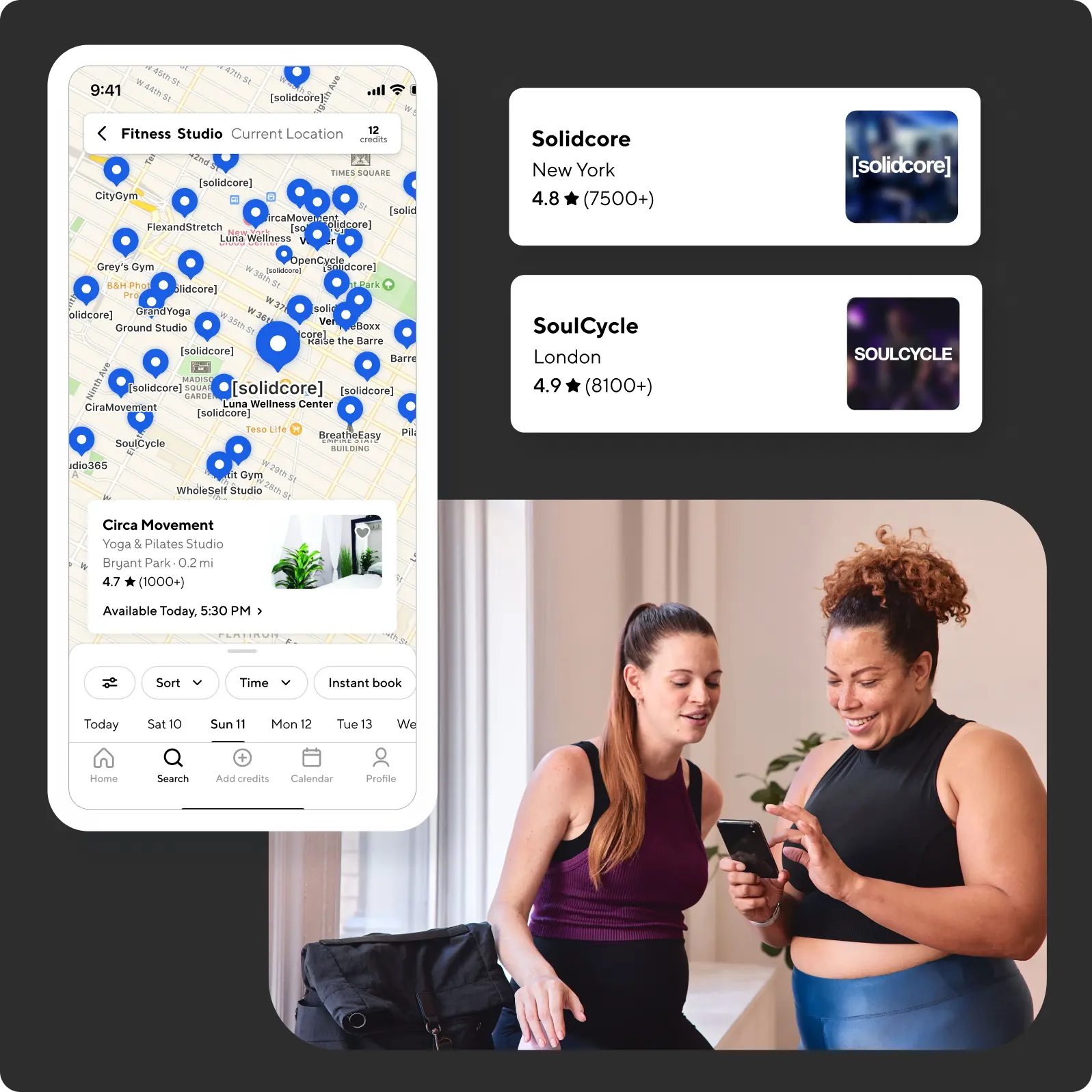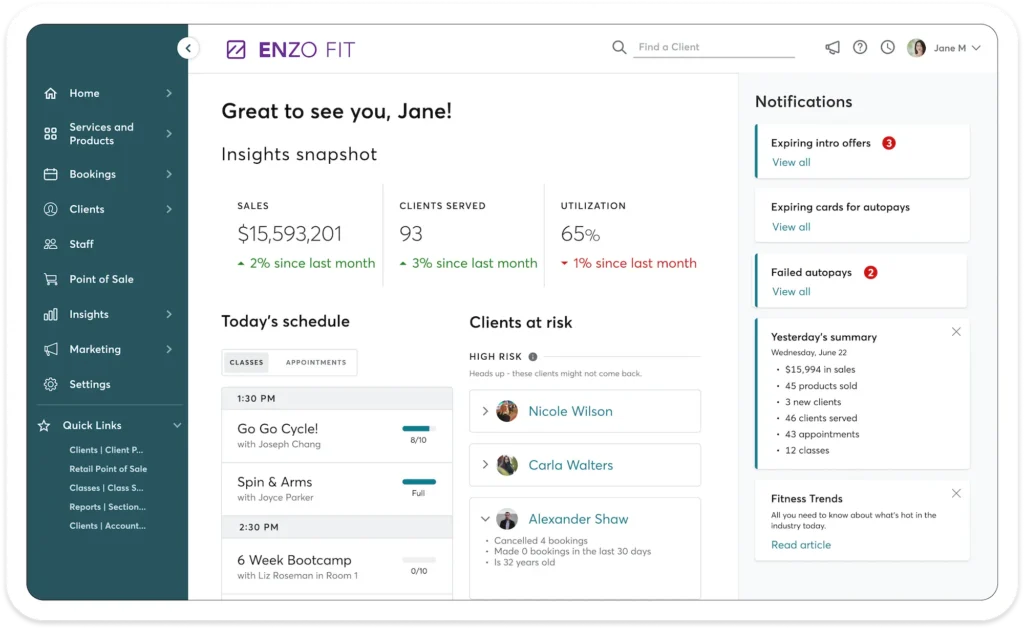Mindbody Bets Big on AI, Machine Learning

Mindbody’s CEO shares how the software company is using artificial intelligence to help fitness and wellness studios grow revenue
Mindbody CEO Fritz Lanman has a compelling answer when asked why the software provider is trusted by so many health and wellness companies, including some of the biggest names in boutique fitness.
“You make more money from Mindbody than you make from any other platform,” Lanman says. “The average business grows 36% after they join Mindbody in their first six months.”
A key reason for that growth is that Mindbody’s customers get access to the 1.9 million active shoppers who use the software company’s consumer-facing app to book services like boutique fitness classes. According to Lanman, it’s the largest concentrated pool of active wellness shoppers on Android or iPhone.
“If you want to get your business in front of that many people, the alternative would be to pay Facebook, Instagram or Google for ads,” the Mindbody CEO notes. “For that spend, the ROI isn’t guaranteed. In our system, we have tools that drive discoveries for you. If we can prove through a consumer survey that we discovered a person for you, we’ll take a fee on that purchase. But it’s guaranteed ROI, since you’re only paying if you get discovered.”

In 2021, Mindbody acquired ClassPass, a monthly subscription service that allows users to book last-minute seats in gyms, studios and spas. The deal gave Mindbody’s customers access to even more potential members. To alleviate any concerns studios may have about selling seats for less than full cost, Mindbody offers its customers a 90-day ClassPass guarantee: if using the subscription service doesn’t make them money, Mindbody promises to pay them back twice what they lost.
Since the acquisition, “a lot more of the Mindbody customer base is taking advantage of ClassPass to grow their businesses,” Lanman says.
When It Comes to AI, Data Is King
Looking ahead, Minbody has its sights set on a new way to help its customers grow their businesses: artificial intelligence and machine learning.
“We’re starting to layer in a ton of features that help you grow your business even more, including machine learning and AI-powered tools that help business owners do things like convert more prospects, retain their audiences better, drive more purchases and get more bookings,” Lanman says.
Minbdody’s size makes it uniquely positioned among fitness and wellness software platforms to leverage the powers of AI, Lanman believes.
“With these large language models, businesses that have huge datasets don’t have to invent new math, we all can use the same techniques and open-source models,” he explains. “The key is, which players have enough data to make the AI good? Mindbody has the biggest platform. Because of our scale, we have the data to do things with AI that our competition can’t.”
Mindbody’s AI Plans
Lanmnan shared some of Mindbody’s current and upcoming initiatives around AI and machine learning.
Already up and running is a feature called Messenger[ai], Mindbody’s AI-powered front-desk assistant, which automatically responds to missed calls, fields questions and helps clients book and buy services.
“At its core, it’s a chatbot,” Lanman explains. “It’s a widget that you put into your site. So on your business webpage, when a prospect comes in, it can ask them questions like, ‘What availability do you have for an appointment?’ A client can actually go all the way through the booking process just by interacting with the chatbot.”
The Messenger[ai] feature should prove popular with Millenials and GenZers, who typically prefer a human-free purchasing experience online.
“Younger consumers want to be able to just chat, they don’t want to have to pick up a phone to book an appointment or a class,” Lanman notes. “It also means you don’t need to have somebody manning the front desk to get a booking.”
Another feature Mindbody has started rolling out to some customers is called Clients At Risk, which essentially uses AI to identify which members are likely to stop coming into class.
“The AI shows customers the folks it thinks are losing their motivation before you’ve actually lost them,” Lanman explains. “That gives you time to act. Go have an intervention with that person, give them a phone call, send them an encouraging text or give them an offer for a discounted personal training session or appointment to hook them back in.”
“It’s essentially retention AI,” he adds. “In the fitness industry, especially in wellness, retention is as big a priority as customer acquisition, because people lose their motivation for wellness and fall out of their routine.”

For Mindbody’s customers using the Clients At Risk tool, the early results have been “spectacular,” Lanman says.
“The businesses using the feature are seeing 30% of those clients be more engaged after just exposing the feature to them,” he notes.
Mindbody is also using AI and machine learning in its consumer-facing app to drive more people into studios.
“We’re using machine learning on search and navigation,” Lanman says. “How can we better match wellness shoppers to wellness businesses and drive as many purchases as we can?”
Another AI feature Mindbody is working on is called “big spender analysis,” although it hasn’t yet been released.
“When a prospect walks into your door, how do you know if they’re going to be one of the big spenders, one of the people who really buy into your business and stays active?” Lanman explains.
Mindbody also plans to use AI to help studios evaluate which of their instructors are likely to become successful in attracting clients.
Beyond AI, Lanman says he’s encouraged by the progress Mindbody is making in improving the speed and reliability of its software in general.
“Mindbody is a little old. It was built a long time ago,” he admits. “So most of our engineering calories are actually going into just making Mindbody incredibly performant, reliable, fast and responsive, and modernizing the UI.”
Those updates, combined with the company’s push into AI, have Lanman excited about what the future holds.
“We already grow businesses more than any other platform, we already have more features than any other. We also have AI that no one else can do because they don’t have our data scale,” he says. “And then you add to that, software that’s getting faster, more reliable and more usable.”



